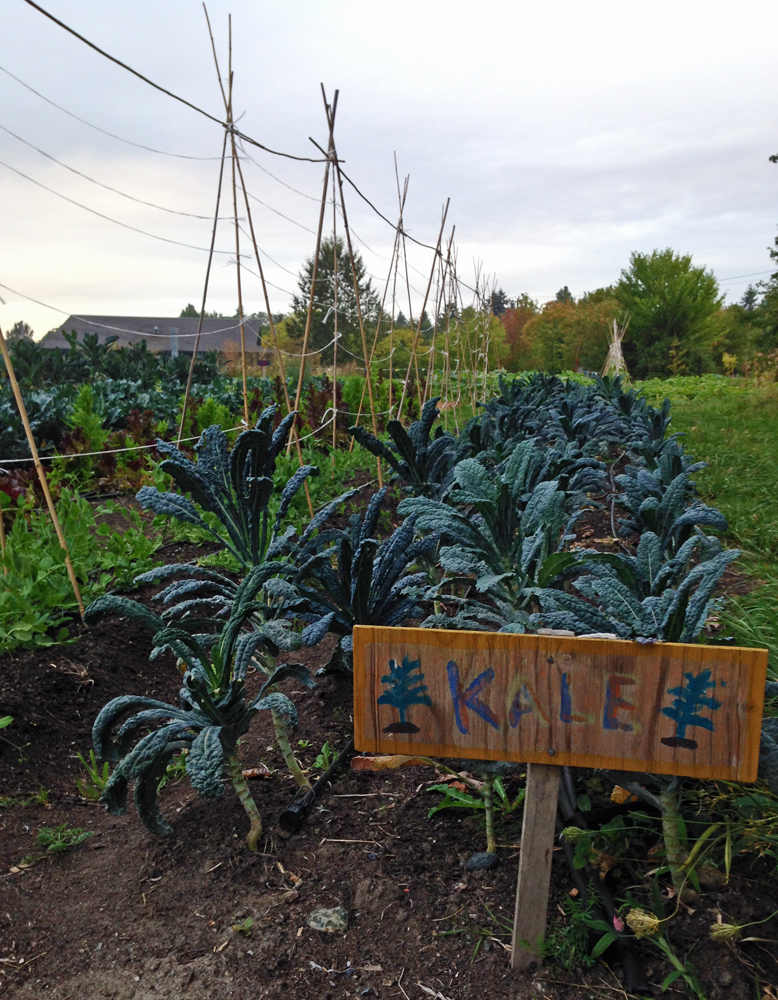The other day, I decided to try something new. Usually, after work I race to yoga (if I'm motivated) or happy hour (if I'm not), but Monday evening I took a farm tour - right in the middle of Seattle.
The main site of the UW Farm is tucked away behind the Center for Urban Horticulture, an agrarian oasis in the midst of Husky stadium, U Village and the bustling UW campus. If you walk through, you will find rows and rows of carefully planted vegetables, a growing permaculture section and a student-designed shed and composting area. At this moment you can find a plenitude of ripe tomatoes, exotic trees of kale and chard, lettuce, onions, and an impressive array of winter squash (part of an intern's squash breeding experiment!) among other summer and fall veggies.
The farm feels peaceful and abundant and, for the students and volunteers that work there, it's a place of learning, community and inspiration.
The evening began with a taste of seasonal produce (always a great way to get my attention) and, at this moment, that means lots and lots of tomatoes. Sarah Geurkink, the farm's manager, laid out a rainbow of tomatoes to sample: golden 'Kellogg's Breakfast', apricot-hued 'Jaune Flamme', stripy 'Green Zebra', inky 'Indigo Rose' and many more, all delicious and subtly different in flavor and texture. Attendees were also encouraged to take pints of mixed cherry tomatoes home with them, which I happily did.
Appetite sated, I settled in to learn more about the farm's mission from enthusiastic student-farmer and UW junior, Kate Doughty.
One of the main goals of the farm is to eliminate the gap between students and the source of their food, to teach people about how the food they eat is actually produced. They strive to be an educational resource for the university and the community. That's one of the reasons they have expanded from the original 2006 site - three beds at the Botany greenhouse - to two other areas. The first is at the CUH. Now the main UW Farm site, it was created with a grant from the Campus Sustainability Fund. Most recently, vegetable plots were laid out between the buildings of new student apartment complex, Mercer Court.
At Mercer Court, on any given day, tenants and passers-by can see people preparing soil, planting, watering and harvesting. When volunteers were in the labor-intensive process of building the beds and prepping them for planting, a curious student leaned out their window to watch, then called down to find out what was going on and eventually came down to help. It's this kind of spontaneous interaction that is exciting.
The farm's mission to raise awareness and encourage active participation in the food system is working. Volunteers come not just from the university, but from the greater community as well. In fact, everyone is welcome at the farm: to volunteer, attend events, and learn. The students want the farm to be a place where "people are able to come together over a mutual love of food," Kate puts it simply. It's hard not to share her excitement when she talks about building connections with people based on ideas - about the food system, the farming system - topics that often arouse passion and debate.
There are lots of ways for students to learn. There are weekly Farm Ed classes, beekeeping classes and internships where students get credit for working on the farm and creating farm projects. Many different departments are involved: architecture students built the garden shed and the student group Engineers Without Borders is in the process of designing and building a new greenhouse on the CUH site, where student-farmers will be able to extend the growing season and cure their produce.
As Jessica Farmer, the Adult Education Supervisor at the UW Botanic Gardens and a former UW grad student explains, students aren't just learning about plants. They are learning math, science, history, politics and business as well. Katy recently took a class called The Urban Farm, where she learned practical farming skills, but also the business side of urban agriculture. Because in reality, farming is a business, and the UW farm is no exception. Students learn about marketing and selling their produce. They run a Friday farm stand on the Burke-Gilman Trail and sell to the campus restaurant, Cultivate, to make enough money to keep things running.
Kate calls it a half-business, half-student group. But most importantly, it's "a place to learn about something that is important but that you wouldn't know much about if you didn't grow up on a farm yourself." The UW Farm teaches people why food and farming should matter to them.
I had a fabulous evening on the farm and I highly encourage everyone to go visit and participate. Visit the Food at UW website for more information and watch the farm's Facebook page to find upcoming events like pizza bakes, with fresh-picked pizza toppings!
Don't miss the Monday Night Lites, a series of free monthly talks by UW students and master gardeners, at the Center for Urban Horticulture. The next talk is Gardening with Native Plants on October 6th. Also on Mondays, a plethora of gardening and food resources: the Elizabeth C. Miller Library is open late to the public, as is the Hyde Herbarium and, during mushroom season, the Puget Sound Mycological Society will be there as well.











